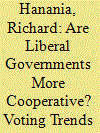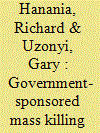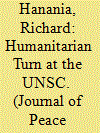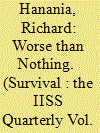| Srl | Item |
| 1 |
ID:
167369


|
|
|
|
|
| Summary/Abstract |
Among both elites and the mass public, conservatives and liberal differ in their foreign policy preferences. Relatively little effort, however, has been put toward showing that, beyond the use of force, these differences affect the day-to-day outputs and processes of foreign policy. This article uses United Nations voting data from 1946 to 2008 of the five major Anglophone democracies of the United States, the United Kingdom, Canada, Australia, and New Zealand to show that each of these countries votes more in line with the rest of the world when liberals are in power. This can be explained by ideological differences between conservatives and liberals and the ways in which the socializing power of international institutions interact with preexisting ideologies. The results hope to encourage more research into the ways in which ideological differences among the masses and elites translate into differences in foreign policy goals and practices across governments.
|
|
|
|
|
|
|
|
|
|
|
|
|
|
|
|
| 2 |
ID:
157362


|
|
|
|
|
| Summary/Abstract |
Why do civil wars reoccur? Some scholars emphasize the role of post-war factors, while others locate the causes of civil war recurrence in the dynamics of the conflicts themselves. We build a theory that bridges these arguments by focusing on mass killing. We argue that government mass killing during war reduces opportunities for the opposition to return to military conflict in the future. This allows for longer periods of post-conflict peace. However, government atrocities that begin after the end of a civil war create new grievances without diminishing the ability of opponents to fight. This makes a faster return to conflict more likely. Statistical analysis of all civil wars between 1946 and 2006 strongly supports our arguments, even when we account for selection effects regarding when governments are more likely to engage in mass killing. These results reveal that both during-war and post-war tactics influence civil war recurrence, but that the same tactic can produce different effects depending on the timing of its use.
|
|
|
|
|
|
|
|
|
|
|
|
|
|
|
|
| 3 |
ID:
180191


|
|
|
|
|
| Summary/Abstract |
The UN Security Council (UNSC) has transformed from a body almost exclusively focused on conflict to one that addresses a wide variety of issues. Despite a series of powerful works in recent years showing how international norms have developed over time, we still lack clear understanding of why and when international institutions change their missions. This article argues that while international politics is usually characterized by inertia, shocks to the system, or focal point events, can compel rational actors to adopt new logics of appropriateness. Since 1945, the end of the Cold War and the signing of the Helsinki Accords stand out as such events. Through latent Dirichlet allocation, a machine learning algorithm used to classify text, UNSC resolutions between 1946 and 2017 can be divided into the subjects of War, Punitive, and Humanitarian. The topic Humanitarian exploded in frequency after the Cold War, and more refined models show that words related to human rights and elections similarly increased after Helsinki. These changes are rapid and occur in almost the immediate aftermath of focal point events, showing their importance for norm diffusion. The analysis also reveals another shift towards humanitarian topics in the mid-2000s, demonstrating the ability of topic modeling to uncover changes that have been missed by earlier kinds of analysis.
|
|
|
|
|
|
|
|
|
|
|
|
|
|
|
|
| 4 |
ID:
176534


|
|
|
|
|
| Summary/Abstract |
Rather than seek to stop human-rights abuses through regime change, the United States should choose engagement and seek to end civil wars.
|
|
|
|
|
|
|
|
|
|
|
|
|
|
|
|